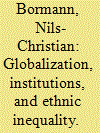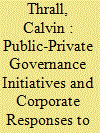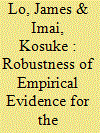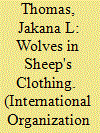|
|
|
Sort Order |
|
|
|
Items / Page
|
|
|
|
|
|
|
| Srl | Item |
| 1 |
ID:
179863


|
|
|
|
|
| Summary/Abstract |
In this article I develop a new theory of how globalization in the form of increasing potential foreign direct investment (FDI) inflows affects democratization. As the level of potential FDI inflows increases, workers become more willing to support democratization because of the large wage benefits from liberalizing FDI under democracy, while capitalists become less willing to support democratization because of their increasing need for protection from the dictator in the form of FDI restrictions. Increased demand for protection allows dictators to extract larger share of rents from capitalists. The effect of increasing potential FDI on democratization is ambiguous because it increases both workers’ incentive to revolt and dictators’ resistance to democratization.
|
|
|
|
|
|
|
|
|
|
|
|
|
|
|
|
| 2 |
ID:
179869


|
|
|
|
|
| Summary/Abstract |
American politicians repeatedly and strenuously invoke concerns about fairness when pitching their trade policies to their constituents, unsurprisingly since fairness is one of the most fundamental and universal moral concepts. Yet studies to date on public opinion about trade have not been designed in such a way that they test whether fairness is important, nor whether the mass public applies fairness standards impartially. Drawing on findings in social psychology and behavioral economics, we develop and find evidence for an “asymmetric fairness” argument. In a national survey of Americans, we find strong evidence that fairness, conceived in terms of equality, is crucial for understanding support for potential trade deals and support for renegotiating existing ones. Americans view as most fair and most preferable outcomes in which concessions and benefits are equal across countries, especially when those equal benefits match productivity. However, we find that Americans have an egoistically biased sense of fairness, responding particularly negatively to any outcome that leaves the United States relatively worse off—a sense of injustice that does not extend to the same degree to relative gains for Americans.
|
|
|
|
|
|
|
|
|
|
|
|
|
|
|
|
| 3 |
ID:
179862


|
|
|
|
|
| Summary/Abstract |
Recent research has shown that inequality between ethnic groups is strongly driven by politics, where powerful groups and elites channel the state's resources toward their constituencies. Most of the existing literature assumes that these politically induced inequalities are static and rarely change over time. We challenge this claim and argue that economic globalization and domestic institutions interact in shaping inequality between groups. In weakly institutionalized states, gains from trade primarily accrue to political insiders and their co-ethnics. By contrast, politically excluded groups gain ground where a capable and meritocratic state apparatus governs trade liberalization. Using nighttime luminosity data from 1992 to 2012 and a global sample of ethnic groups, we show that the gap between politically marginalized groups and their included counterparts has narrowed over time while economic globalization progressed at a steady pace. Our quantitative analysis and four qualitative case narratives show, however, that increasing trade openness is associated with economic gains accruing to excluded groups in only institutionally strong states, as predicted by our theoretical argument. In contrast, the economic gap between ethnopolitical insiders and outsiders remains constant or even widens in weakly institutionalized countries.
|
|
|
|
|
|
|
|
|
|
|
|
|
|
|
|
| 4 |
ID:
179866


|
|
|
|
|
| Summary/Abstract |
Multinational firms operate in multiple national jurisdictions, making them difficult for any one government to regulate. For this reason the firms themselves are often in charge of their own regulation, increasingly in conjunction with international organizations by way of public-private governance initiatives. Prior research has claimed that such initiatives are too weak to meaningfully change firms’ behavior. Can public-private governance initiatives help firms self-regulate, even if they lack strong monitoring or enforcement mechanisms? I take two steps toward answering this question. First, I introduce a new measure of firms’ performance on ESG (environmental, social, and governance) issues: the extent to which the firms issue public responses to claims of misconduct from civil society actors. Second, I argue that public-private governance initiatives allow firms to benefit from the legitimacy of their public partners, lowering the reputational cost of transparent response. Employing novel data on firm responses to human rights allegations from the Business and Human Rights Resource Center, I find that membership in the largest and most prominent initiative, the United Nations Global Compact, significantly increases firms’ propensity to respond transparently to stakeholder allegations. These results suggest a limited but important role for public-private initiatives in global governance.
|
|
|
|
|
|
|
|
|
|
|
|
|
|
|
|
| 5 |
ID:
179864


|
|
|
|
|
| Summary/Abstract |
In response to the political turmoil surrounding the recent refugee crisis, destination countries swiftly implemented new immigration and asylum policies. Are such countercrisis policies effective in mitigating political instability by reducing anti-immigrant backlash and support for radical-right parties? The present study exploits two surveys that were coincidentally fielded during significant policy changes, sampling respondents right before and immediately after the change. I employ a regression discontinuity design to identify the short-term causal effect of the policy change on public opinion within a narrow window of the sampling period. The findings show that both Swedish border controls and the EU–Turkey agreement significantly reduced public opposition to immigration in Sweden and Germany, respectively. In Germany, support for the AfD party also decreased following the new policy. Public opinion time trends suggest that the policy effects were short lived in Sweden but durable in Germany. These effects are similar across different levels of proximity to the border and are accompanied by increasing political trust and a sense of government control over the situation. The findings have implications for understanding the impact of border controls on international public opinion, as well as for assessing the electoral effect of policy responses to global refugee crises.
|
|
|
|
|
|
|
|
|
|
|
|
|
|
|
|
| 6 |
ID:
179870


|
|
|
|
|
| Summary/Abstract |
The democratic peace—the idea that democracies rarely fight one another—has been called “the closest thing we have to an empirical law in the study of international relations.” Yet, some contend that this relationship is spurious and suggest alternative explanations. Unfortunately, in the absence of randomized experiments, we can never rule out the possible existence of such confounding biases. Rather than commonly used regression-based approaches, we apply a nonparametric sensitivity analysis. We show that overturning the negative association between democracy and conflict would require a confounder that is forty-seven times more prevalent in democratic dyads than in other dyads. To put this number in context, the relationship between democracy and peace is at least five times as robust as that between smoking and lung cancer. To explain away the democratic peace, therefore, scholars would have to find far more powerful confounders than those already identified in the literature.
|
|
|
|
|
|
|
|
|
|
|
|
|
|
|
|
| 7 |
ID:
179868


|
|
|
|
|
| Summary/Abstract |
How does the design of military institutions affect who bears the costs of war? We answer this question by studying the transformative shift from segregated to integrated US military units during the Korean War. Combining new micro-level data on combat fatalities with archival data on the deployment and racial composition of military battalions, we show that Black and white soldiers died at similar rates under segregation. Qualitative and quantitative evidence provides one potential explanation for this counterintuitive null finding: acute battlefield concerns necessitated deploying military units wherever soldiers were needed, regardless of their race. We next argue that the mid-war racial integration of units, which tied the fates of soldiers more closely together, should not alter the relative fatality rates. The evidence is consistent with this expectation. Finally, while aggregate fatality rates were equal across races, segregation enabled short-term casualty discrepancies. Under segregation there were high casualty periods for white units followed by high casualty periods for Black units. Integration eliminated this variability. This research note highlights how enshrining segregationist policies within militaries creates permissive conditions for either commanders' choices, or the dictates and variability of conflict, to shape who bears war's costs.
|
|
|
|
|
|
|
|
|
|
|
|
|
|
|
|
| 8 |
ID:
179867


|
|
|
|
|
| Summary/Abstract |
In the current era, many of the military threats that state leaders face come from domestic and transnational nonstate actors. Military alliances are recognized as an important policy strategy to counter military threats, but existing research has primarily been focused on threats from other states and has difficulty uncovering a consistent relationship between external threat and alliance formation. We argue that this discrepancy arises from the failure to recognize that many threats are not external to the state. We contend that alliance formation is motivated both by external threats from other states and by internal threats that make civil conflict more likely. Moreover, we argue that leaders design alliance obligations differently when faced with internal threats. An empirical analysis of alliance formation from 1946 to 2009 shows that while external threats motivate the formation of defense pacts, internal threats encourage the formation of consultation pacts. Internal threats with the greatest potential for internationalization also encourage the formation of neutrality/nonaggression pacts. This research deepens our understanding of how states design security policies to deal with the threats posed by nonstate actors, a salient concern of leaders in the twenty-first century, and helps us to understand the variety of alliance obligations that we observe.
|
|
|
|
|
|
|
|
|
|
|
|
|
|
|
|
| 9 |
ID:
179865


|
|
|
|
|
| Summary/Abstract |
Although a substantial body of research argues that women provide terrorist organizations with important tactical benefits, few studies draw out the implications of this argument or examine whether female recruits affect the outcomes of terrorist operations. Using data on individual suicide attacks from 1985 to 2015, I show that an attacker's gender influences the lethality of an attack. However, this effect is conditional upon the gender norms of the state in which the attack occurs. The results demonstrate that a female advantage is more apparent only in societies where a woman's role in public life is limited; attacks by female suicide attackers are more deadly in countries where women are largely absent from the workforce, civil society, and protest organizations. I also assess whether counterterrorists eventually adapt to the use of female suicide terrorists. The results demonstrate that female attack lethality is declining with time, suggesting that security forces eventually adapt to women's participation in terrorism. These findings are consequential because they highlight the effect of persistent gender biases on counterterrorism efforts.
|
|
|
|
|
|
|
|
|
|
|
|
|
|
|
|
|
|
|
|
|